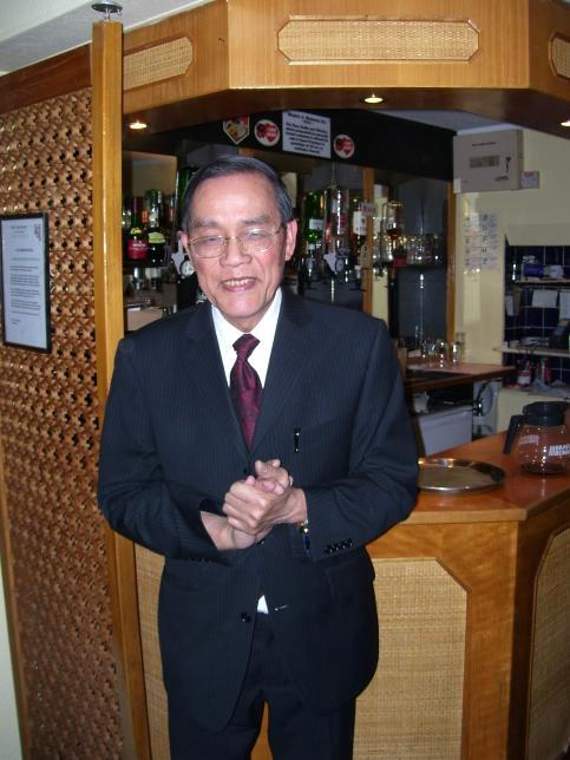CHINESE New Year is a time for prosperity, health, wealth and family.
But for Chinese restaurant Kar Ling Kwong, located in East Street, Farnham, it marks the end of an era.
The family run restaurant and take away is set to close next Saturday (February 23), timed to coincide with the end of the traditional 15 days spent celebrating the new year. The current owners will be retiring.
Kar Ling Kwong was opened 55 years ago in 1964 and continues to be a family run business.
Henry Liu opened the restaurant after converting a cottage in East Street. He gave many Farnham residents their first taste of Chinese food.
The restaurant was later expanded when, in 1977, Henry also purchased the cottage next door.
As reported in the January 7, 2011, edition of the Farnham Herald, Henry sadly passed away in Frimley Park Hospital just a few weeks prior to the report on Christmas Day.
During his 46 years at Kar Ling Kwong, Henry raised well over £300,000 for local causes through his charity banquets and continued to fundraise even during his illness with throat cancer.
The last banquet hosted by Henry before he handed over the running of the restaurant to family friends was in aid of the Army Benevolent Fund, with other beneficiaries over the years ranging from the Royal National Lifeboat Institution (RNLI) to local hospitals and Phyllis Tuckwell Hospice.
Henry was made an MBE for his services to the community in 2004, as well as receiving Farnham Town Council’s Services to Farnham Award in the year before his death.
Many residents will remember Kar Ling Kwong for bringing Chinese dancing dragons to the Farnham Carnival parade each June in previous years – as pictured right.
Dragons are a key part of the traditional Chinese New Year story, as told by colleagues at Kar Ling Kwong to the Herald, as a dragon descended from the heavans.
The story goes that villagers would hold red lanterns, to protect themselves, bang on drums and let off fire crackers to scare away the dragon.
Lions are also iconic around the new year period. It is believed that people had heard of the lion, although thought it was a ‘mythical’ creature as they were not native to China.
They embraced this and came up with what they believed a lion to look like, as still shown in Chinese culture.
The new year is full of symbolism, right down to the food eaten.
For example, dumplings are very traditional during this celebration as they represent roundness and a complete cycle, and are usually made by the whole family together. Spring rolls are golden in colour, which again is very symbolic.
Steamed fish and chicken are served whole at new year, representing the whole coming together.
On New Year’s Eve, families traditionally gather for dinner where they share a banquet and houses are decorated with flowers.
During new year, this year celebrated on February 5, red packets – ‘laisee’ – are given to children in the morning, with well wishes for good health and prosperity.
These are also given to people who are unmarried, but once a couple are married they too are expected to give.
The date of which Chinese New Year falls changes each year as it is celebrated on the first day of the first month in the lunar calendar.
This year marks the year of the pig – one of 12 animals represented in rotation; rat, ox, tiger, rabbit, dragon, snake, horse, sheep, monkey, rooster, dog and pig.
Each year is also associated with an element, including gold (metal), wood, fire, water and earth.
Thought of as being similar to zodiac signs, each year represents different traits.
For example, according to the story where the animals originate, the ox was expected to win a race across a river as it had endurance. But the rat was cunning, jumping on to the back of the ox to cross the river, jumping off again and winning the race.
A baby’s name can even be based around the year he/she was born as everything is centered around balance, similar to yin and yang.
If a child is born during a metal year, for example, then they should not wear metal jewellery as a means to rebalance.With Kar Ling Kwong set to close its doors at the end of the new year period, the family are encouraging people to enjoy one final taste of their banquet menu, which is “like it’s Chinese New Year every day”, or choose from one of the 140 authentic dishes.
The family at Kar Ling Kwong said they are “very happy” to have shared their cuisine with Farnham.
Mayor of Farnham, David Attfield, paid tribute to the restaurant and said: “I was very sad to learn of the proposed closure of this long established business. We have fond memories of Henry’s past support of our town carnival and local charities.”
The family at Kar Ling Kwong continued that it has been “very fun” sharing their culture with the Farnham community and added: “Thank you to everyone for their support over the years. We wish them a happy Chinese New Year.”
* Kar Ling Kwong will remain open seven days a week, from noon to 2pm and 5.30-11pm, until February 23. Visit before then to celebrate the Chinese new year with a traditional all-you-can-eat banquet.


_-004.jpeg?width=209&height=140&crop=209:145,smart&quality=75)


Comments
This article has no comments yet. Be the first to leave a comment.